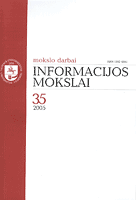Žiniasklaida kaip aktyvus politinių procesų veikėjas informuojant visuomenę apie Europos Sąjungą: lyginamasis požiūris
Understanding the Role of the Media in EU News Provision: Comparative Approach
Author(s): Aušra Vinciūnienė, Auksė BalčytienėSubject(s): Economy
Published by: Vilniaus Universiteto Leidykla
Summary/Abstract: The overall objective of this article is to investigate the media’s role in EU political process and its impact on the European public sphere with regard to political actors (persons and institutions on both European and national levels) and mechanisms. In the centre of attention is the question how the mass media manage and produce EU coverage and assessment in the context of different journalistic and editorial cultures, standards and ethical considerations in Europe. There are two levels of analysis as performed in the research study presented in this article. One aspect of analysis deals with the news agenda analysis (NAA) which was performed on European news collected from the sample media during three weeks of March 7–27, 2005. As agreed among the project partners, three types of media were included in the sample, namely different types of dailies, TV stations and in some countries also news agencies. Another aspect of analysis covers opinions and assessments of journalists and editors, all working in the media which was first analyzed according to NAA principles. The article discusses how European media professionals reflect on the EU news making processes and evaluate their assessments with respect to their professional roles as well as the type of media (print, broadcast, news agency or online) that they represent. For this purpose, twenty people were interviewed in the period June–August 2005. Respondents were of middle management position, such as duty/ deputy editors, or directors of political or economy news departments, and reporters. Decision-making was assessed in both conventional (print, broadcast) and online-only media. Interviews with journalists show a number of challenges in reporting Europe such as the difficult language of official bodies, lack of time. Also, there is an abundance of information which comes from EU institutions, EU Representations, but which has a very little news value. In addition, journalists acknowledge that they are not EU experts, thus much of information slips through their eyes, etc. As a conclusion, the article proposes an “ecological viewpoint”, which emphasises the need to tailor communication patterns of all involved actors, such as mass media, public and EU institutions.
Journal: Informacijos mokslai
- Issue Year: 2006
- Issue No: 37
- Page Range: 91-109
- Page Count: 19

